When you volunteer in disaster zones, you must prioritize ethical principles like respect, cultural sensitivity, and community autonomy. Your actions should aim to support local needs without causing harm or dependency, while respecting local customs and power dynamics. Fair resource distribution and sustainable practices are essential to prevent negative impacts on economies. By understanding these ethical challenges, you’ll ensure your help contributes positively and responsibly. Keep exploring to discover how to volunteer effectively and ethically in these critical contexts.
Key Takeaways
- Volunteers must adhere to ethical frameworks that promote respect, dignity, and community participation while avoiding exploitation and cultural insensitivity.
- Effective communication, transparency, and cultural humility are essential to build trust and ensure informed decision-making with affected communities.
- Fair resource allocation and prioritization should balance urgency with equity, preventing resentment and supporting sustainable recovery.
- Long-term engagement and community empowerment are vital to foster resilience, reduce reliance on external aid, and promote sustainable development.
- Recognizing power dynamics and respecting local leadership helps prevent exploitation and ensures volunteer efforts support community-led recovery.
Defining the Role of Volunteers in Disaster Relief

When disasters strike, volunteers play a crucial role in providing immediate aid and support. Your motivation to help often stems from a desire to make a difference, whether driven by compassion, community ties, or a sense of duty. Understanding your volunteer role begins with clear training requirements designed to prepare you for the situation. These training sessions cover essential skills like first aid, safety protocols, and effective communication. Your responsibilities may include distributing supplies, assisting with evacuations, or providing emotional support. While your motivation fuels your commitment, proper training ensures you act safely and ethically. Defining your role helps coordinate efforts, maximize impact, and maintain respect for affected communities, ensuring your help aligns with the broader disaster relief strategy. Additionally, familiarity with emotional support and other innovative transportation methods can be useful for logistical support in some relief scenarios. Recognizing the importance of authenticity in your actions can help foster trust and genuine connection with those you assist. Moreover, understanding the significance of effective communication can greatly enhance coordination and the overall success of relief operations.
Cultural Sensitivity and Respect for Local Communities

As volunteers step into disaster-affected communities, showing cultural sensitivity and respect becomes essential to effective aid. Embracing cultural humility helps you recognize your limitations and avoid imposing your values. Engaging with the community fosters trust and ensures your efforts align with local needs. To deepen your understanding, consider these principles:
- Listen actively and validate local voices
- Respect traditions and social norms
- Collaborate with community leaders and members
- Be aware of cybersecurity vulnerabilities, such as cyberattack risks, that can compromise both aid efforts and community trust during disaster response. Developing Cultural Intelligence can further enhance your ability to navigate diverse cultural contexts effectively, especially when considering diverse designs of community resources. Familiarizing yourself with proper resource storage techniques can help maintain the quality and safety of aid supplies in varying environments. Recognizing the importance of cross-cultural communication can facilitate more effective interactions with local populations, ensuring that aid initiatives are respectful and impactful.
Ensuring Informed Consent and Autonomy

You need to clearly explain the risks involved in your volunteer work so others can make informed decisions. Respect their personal choices, even if they differ from your expectations. Ensuring informed consent means they understand what they’re agreeing to and feel free to choose. Being aware of the paint application process and potential hazards helps volunteers make safer, more informed decisions. Familiarity with essential oils and their effects can also be beneficial in understanding how natural remedies might support health during relief efforts. Understanding the contrast ratio of various projectors can help volunteers select appropriate equipment for presentations or communications in the field. Additionally, having knowledge of AI-generated music can aid in creating supportive environments for both volunteers and affected communities.
Clear Communication of Risks
Clear communication of risks is essential to uphold volunteers’ autonomy and guarantee they make informed decisions. Ensuring risk transparency and communication clarity helps volunteers understand potential dangers, enabling them to weigh options responsibly. By providing honest, straightforward information, you respect their right to choose freely. To achieve this, consider these key points:
- Clearly outline specific risks involved in the task
- Use simple language to avoid misunderstandings
- Confirm understanding through feedback or questions
- Incorporate effective communication strategies to enhance understanding and trust
- Recognize the importance of transparency in information sharing to build trust and ensure ethical practices
Additionally, employing transparent messaging techniques can further ensure volunteers grasp the full scope of potential hazards. When you prioritize transparent communication, you foster trust and empower volunteers to decide if they’re comfortable with the potential hazards. This approach not only respects their personal boundaries but also reduces the likelihood of harm caused by misinformation or misinterpretation. Incorporating risk communication techniques rooted in best practices can significantly improve clarity and comprehension. Understanding the role of cultural sensitivities in communication can further adapt messages for diverse volunteer groups. Ultimately, clear communication strengthens ethical volunteer practices in disaster zones.
Respect for Personal Choices
Respect for personal choices is fundamental to ethical volunteerism because it guarantees individuals maintain control over their participation. You must prioritize personal autonomy, ensuring volunteers understand what they’re agreeing to before they commit. Providing clear, honest information allows volunteers to give informed consent, meaning they fully grasp the risks, benefits, and expectations involved. Respecting choices also involves honoring volunteers’ decisions, even if they change their minds or decline certain tasks. You shouldn’t pressure or coerce anyone into participation. By fostering an environment of transparency and respect, you empower volunteers to make autonomous decisions that align with their values and capabilities. Implementing informed consent processes ensures that volunteers are aware of the potential risks, which is essential for ethical engagement. Recognizing the importance of volunteer rights helps maintain ethical standards and builds trust between volunteers and organizations. This approach upholds ethical standards and promotes trust, ultimately benefiting both volunteers and the communities you serve.
Resource Allocation and Prioritization Challenges
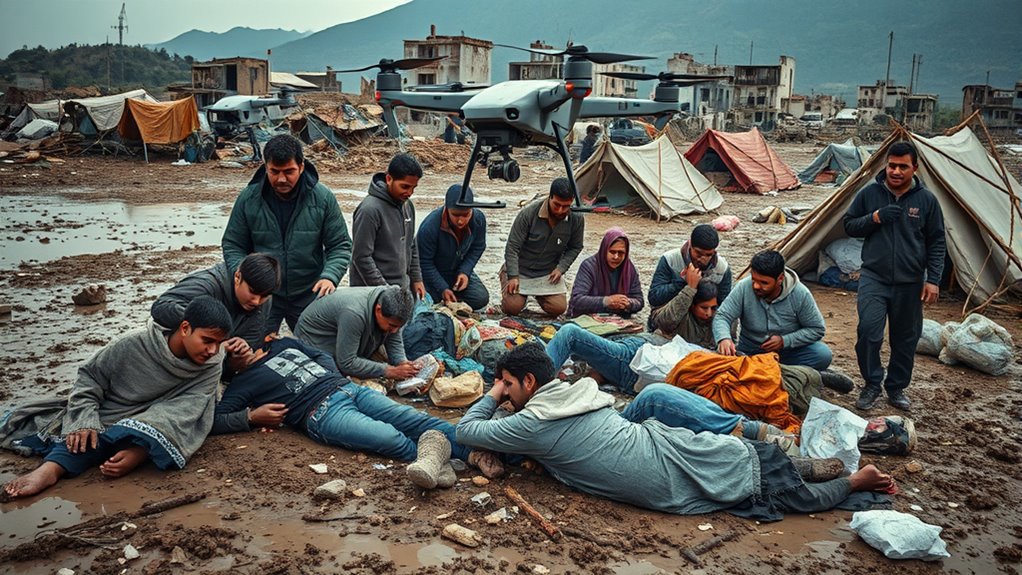
Resource allocation and prioritization pose significant ethical challenges in volunteerism, especially when resources are limited and needs are vast. You must decide how to distribute supplies, aid, and attention fairly, balancing urgency with fairness. This involves resource prioritization—determining who receives help first—and ensuring allocation fairness across communities. Missteps can lead to feelings of neglect or resentment. To navigate these challenges, consider:
Effective resource allocation requires transparency, fairness, and ongoing reassessment to address urgent needs without neglecting vulnerable communities.
- Identifying the most urgent needs without neglecting vulnerable groups
- Transparency in decision-making processes to build trust
- Constant reassessment to adapt to changing circumstances
- Understanding production quantity variance can aid in better planning and resource distribution, ensuring that aid efforts align with actual needs and avoid over- or under-allocation. Additionally, applying insights from Kia Tuning can inform how to optimize resource deployment efficiently, much like tuning a vehicle for peak performance, to maximize impact with limited supplies. Recognizing the importance of resource management helps ensure that aid is distributed effectively and ethically, avoiding waste and ensuring sustainability. Moreover, leveraging data on resource allocation can further enhance fairness and effectiveness in aid distribution.
Avoiding Dependence and Promoting Sustainability
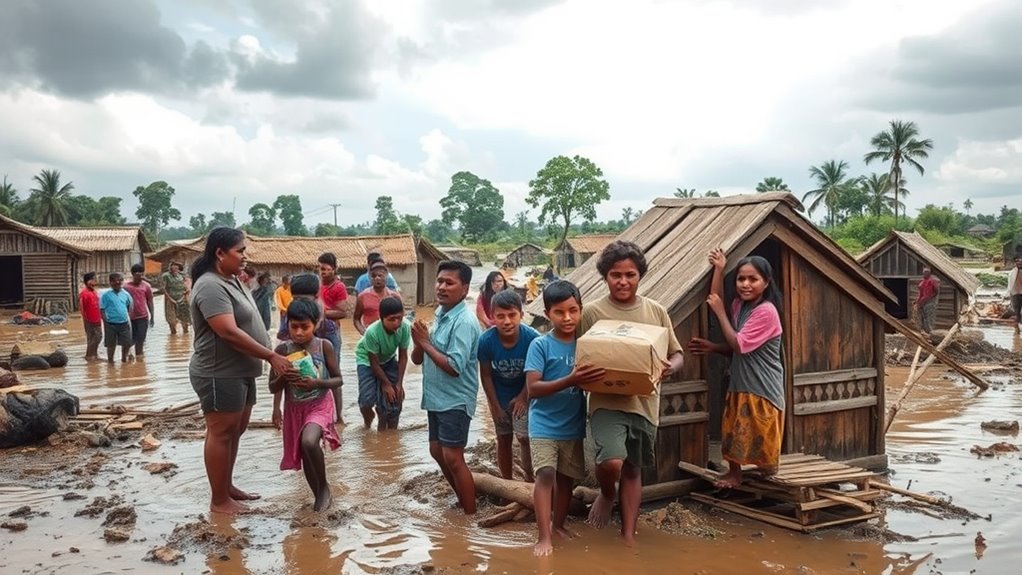
To guarantee volunteer efforts create lasting benefits, it’s essential to focus on avoiding dependence and promoting sustainability. You can do this by supporting initiatives that foster community empowerment and ensure sustainable funding. When communities lead recovery efforts, they build resilience and independence. Avoid creating reliance on external aid by encouraging local ownership and capacity building. To illustrate, consider the following:
| Dependence | Community Empowerment | Sustainability |
|---|---|---|
| External aid | Local leadership | Long-term growth |
| Short-term fix | Skill development | Resilient systems |
| External resources | Community-driven projects | Sustainable funding |
Prioritizing these aspects helps communities thrive beyond immediate disaster response, fostering genuine recovery that lasts. Your support should empower locals to stand strong, not foster dependence.
Navigating Power Dynamics and Ethical Boundaries
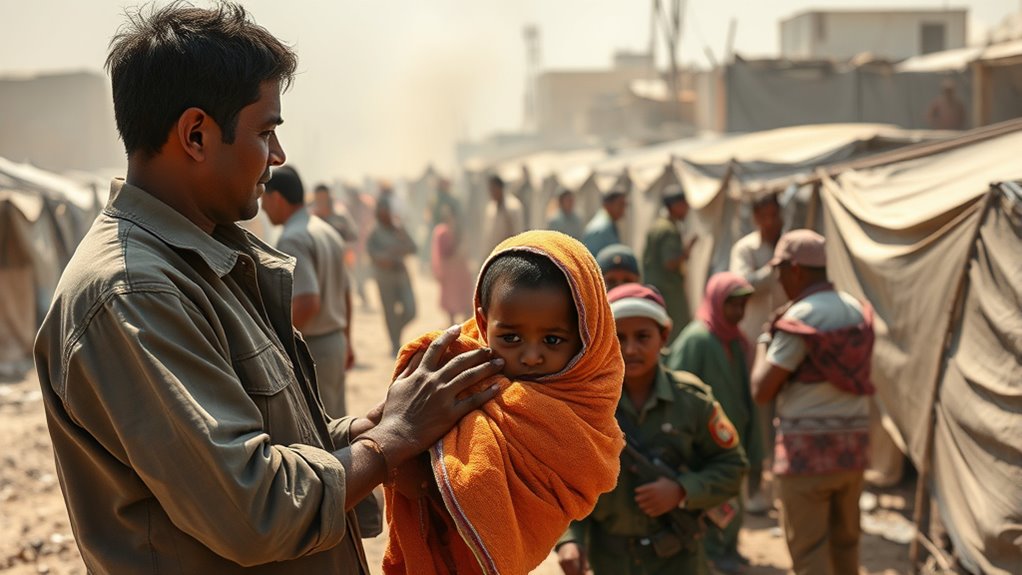
As a volunteer, it’s essential to recognize power imbalances that can affect your work and relationships. Respecting local leadership helps maintain trust and guarantees your efforts align with community needs. Setting clear ethical boundaries protects both you and those you serve, fostering responsible and respectful engagement.
Recognizing Power Imbalances
Recognizing power imbalances is essential for maintaining ethical boundaries in volunteer work because it helps prevent exploitation and fosters respectful relationships. Understanding how power disparities affect interactions allows you to be mindful of your privilege awareness and its impact on the community. When you acknowledge that your position may carry advantages, you’re better equipped to act ethically and avoid unintentionally dominating local voices.
Remember:
- Power disparities can influence decision-making and trust.
- Being aware of your privilege helps you stay humble and respectful.
- Transparency about roles and limitations promotes mutual understanding.
Respecting Local Leadership
Respecting local leadership is crucial for maintaining ethical boundaries in volunteer work because it guarantees that your efforts support, rather than undermine, existing community structures. When you prioritize local leadership, you foster community empowerment by trusting those who understand their own needs best. Recognize that local authorities and organizations have valuable insights into their community’s priorities and resources, which helps build local capacity. Respecting their guidance ensures your work complements their initiatives instead of creating dependency or confusion. By actively listening and collaborating, you avoid overstepping boundaries and reinforce sustainable progress. This approach not only respects cultural norms but also encourages community ownership of recovery efforts, leading to more effective and lasting outcomes in disaster zones.
Defining Ethical Boundaries
Understanding power dynamics is essential for establishing clear ethical boundaries in volunteer work because it helps prevent unintended harm and promotes respectful engagement. When you recognize the influence of your volunteer motivations, you can better navigate ethical dilemmas that arise in disaster zones. Maintaining boundaries requires honesty about your skills, limitations, and the impact of your presence.
Consider these key points:
- Respect the expertise and authority of local leaders to avoid overstepping.
- Reflect on your motivations to ensure they align with community needs.
- Stay aware of potential ethical dilemmas that challenge your role and intentions.
The Impact of Volunteer Presence on Local Economies

Volunteer presence can markedly influence local economies by providing essential services and filling gaps that might otherwise require paid staff. This direct support can boost the economic impact by reducing costs for local organizations and government agencies. However, it can also affect local employment opportunities; when volunteers replace paid workers, it may limit job growth for residents. Conversely, volunteers can stimulate local spending, benefiting small businesses and markets. The influx of volunteers often increases demand for housing, food, and transportation, providing short-term economic benefits. Yet, these effects can be mixed, depending on the scale and duration of volunteer activities. You should consider whether volunteer efforts support sustainable economic development or inadvertently hinder long-term employment prospects for the community.
Long-Term Commitments Versus Short-Term Aid
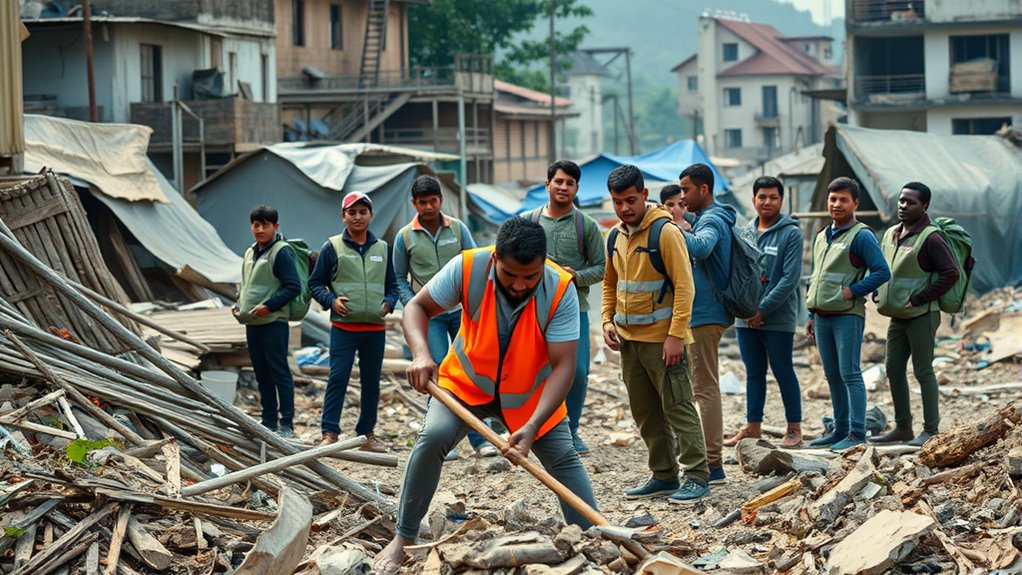
When considering the effectiveness of volunteer efforts, you might ask whether long-term commitments or short-term aid better serve community needs. Short-term aid provides immediate relief but can lead to volunteer burnout and disrupt cultural integration. Long-term commitments foster trust, understanding, and sustainable growth. However, they require patience and consistent resources.
To balance both approaches, reflect on:
- The importance of building genuine relationships over time
- The risk of burnout among volunteers who stay too long without proper support
- The need for cultural sensitivity to ensure aid is respectful and effective
Ultimately, successful volunteerism combines short-term responsiveness with long-term dedication, ensuring aid is impactful without compromising community integrity or volunteer well-being.
Developing Ethical Guidelines for Volunteer Engagement
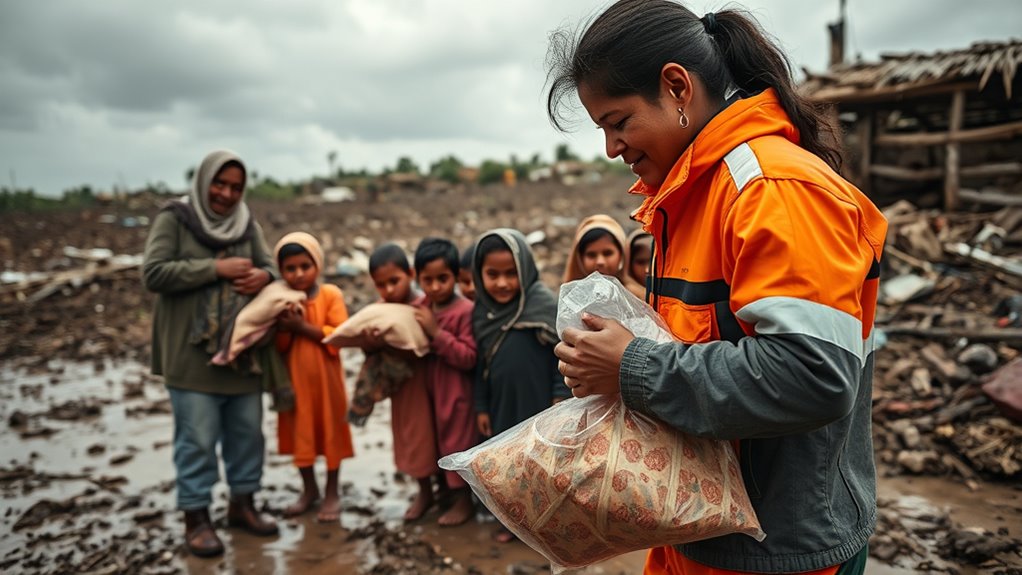
How can organizations guarantee that their volunteer efforts are ethical and respectful? Developing clear ethical guidelines is essential. Start by understanding volunteer motivations—people volunteer for different reasons, and these influence their behavior. Address ethical dilemmas proactively by establishing protocols that prioritize respect for local communities, cultural sensitivity, and safety. These guidelines should clarify roles, boundaries, and expectations, reducing confusion and potential harm. Training volunteers on ethical practices helps ensure they act responsibly in complex disaster zones. Regularly reviewing and updating these guidelines allows organizations to adapt to new challenges and lessons learned. Ultimately, transparent policies foster trust, safeguard vulnerable populations, and uphold the integrity of disaster relief efforts. With solid ethical frameworks, volunteer engagement becomes a force for genuine and respectful aid.
Frequently Asked Questions
How Do Volunteers Handle Conflicts Between Local Customs and Aid Protocols?
When facing conflicts between local customs and aid protocols, you should recognize cultural clashes and ethical dilemmas. You actively listen to community members to understand their perspectives and respect their traditions. You adapt your approach where possible, ensuring your aid aligns with local values without compromising safety or ethics. Open communication helps resolve tensions, fostering trust and cooperation, so you can provide effective assistance while honoring the community’s cultural integrity.
What Measures Prevent Volunteers From Overstepping Their Expertise During Relief Efforts?
You’re about to step into a role with enormous responsibility, so it’s vital to respect scope boundaries and avoid overreach. To prevent this, organizations enforce strict skill verification processes and clear guidelines, ensuring volunteers only perform tasks within their expertise. Regular training and supervision help you stay aligned with your abilities, preventing potential harm. Remember, staying within your scope isn’t just important—it’s the difference between effective aid and unintended damage.
How Are Volunteers’ Personal Beliefs Managed Within Culturally Sensitive Contexts?
You need to recognize that personal belief conflicts can arise in culturally sensitive contexts. To manage these, organizations provide cultural sensitivity training, helping you understand and respect local customs and beliefs. This training encourages you to set aside personal biases, ensuring your actions support community needs without causing offense. By actively engaging in these programs, you contribute to respectful, effective relief efforts that honor local cultures and promote trust.
What Training Ensures Volunteers Respect Local Decision-Making Processes?
You might think anyone can step into a disaster zone and help, but cultural sensitivity and ethical training are vital. To guarantee you respect local decision-making, you’ll undergo specialized training that emphasizes understanding cultural norms, power dynamics, and local leadership. Ironically, the best way to avoid imposing your own beliefs is to learn how to listen and adapt, making cultural sensitivity the foundation of effective and respectful volunteer efforts.
How Do Organizations Evaluate the Long-Term Impact of Volunteer Interventions?
You can evaluate the long-term impact of volunteer interventions through impact assessment and community integration efforts. By collecting data on how the community benefits over time, you identify positive changes and areas needing improvement. Engaging local residents in feedback guarantees your efforts align with their needs, fostering sustainable development. Regular evaluations help you measure progress, adapt strategies, and ensure your volunteer work truly benefits the community in the long run.
Conclusion
As you consider volunteering in disaster zones, remember it’s like tending a delicate garden—you must nurture it carefully without overwhelming it. By respecting local communities, prioritizing sustainability, and following ethical guidelines, you guarantee your help makes a genuine difference. Your actions should empower rather than hinder, fostering resilience long after the crisis fades. Stay mindful of your impact, and you’ll become a positive force in rebuilding lives and communities.










